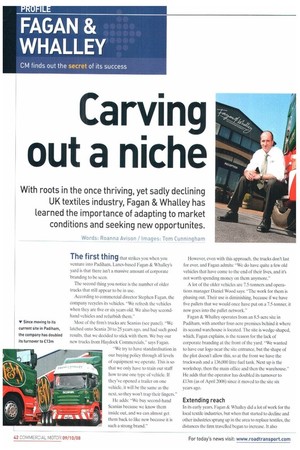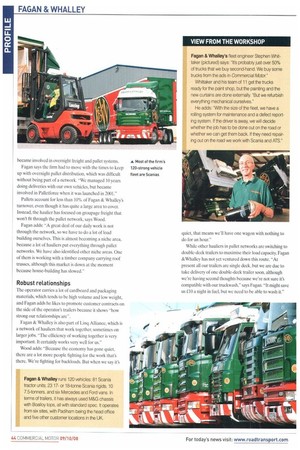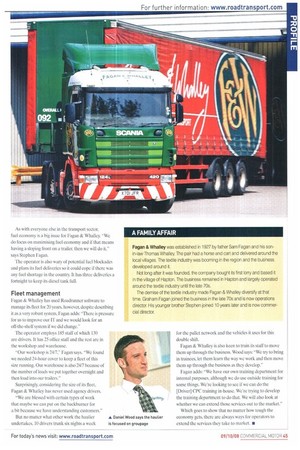Carving out a niche
Page 42

Page 44

Page 45

If you've noticed an error in this article please click here to report it so we can fix it.
With roots in the once thriving, yet sadly declining UK textiles industry, Fagan & Whalley has learned the importance of adapting to market conditions and seeking new opportunites.
Words: Roanna Avison / Images: Tom Cunningham
The first thing
that strikes you when you venture into Padiham, Lanes-based Fagan & Whalley's yard is that there isn't a massive amount of corporate branding to be seen.
The second thing you notice is the number of older trucks that still appear to be in use.
According to commercial director Stephen Fagan, the company recycles its vehicles. "We refresh the vehicles when they are five or six years old. We also buy secondhand vehicles and refurbish them."
Most of the firm's trucks are Scanias (see panel). -We latched onto Scania 20 to 25 years ago, and had such good results, that we decided to stick with them. We buy our new trucks from Haydock Commercials,says Fagan. "We try to have standardisation in our buying policy through all levels of equipment we operate. This is so that we only have to train our staff how to use one type of vehicle. If they've opened a trailer on one vehicle, it will be the same as the next, so they won't trap their fingers."
He adds: -We buy second-hand Scanias because we know them inside out, and we can almost get them back to like new because it is such a strong brand." However, even with this approach, the trucks don't last for ever. and Fagan admits: -We do have quite a few old vehicles that have come to the end of their lives, and it's not worth spending money on them anymore."
A lot of the older vehicles are 75-toriners and operations manager Daniel Wood says: "The work for them is phasing out. Their use is diminishing, because if we have five pallets that we would once have put on a 73-tonner it now goes into the pallet network."
Fagan & Whalley operates from an 8.5-acre site in Padiham, with another four-acre premises behind it where its second warehouse is located. The site is wedge-shaped, which, Fagan explains, is the reason for the lack of corporate branding at the front of the yard. "We wanted to have our logo near the site entrance, but the shape of the plot doesn't allow this, so at the front we have the truckwash and a 136,000 litre fuel tank. Next up is the workshop, then the main office and then the warehouse." He adds that the operator has doubled its turnover to £13m (as of April 2008) since it moved to the site six years ago.
Extending reach
In its early years, Fagan & Whalley did a lot of work for the local textile industries, but when that started to decline and other industries sprung up in the area to replace textiles, the distances the firm travelled began to increase. It also became involved in overnight freight and pallet systems.
Fagan says the firm had to move with the times to keep up with overnight pallet distribution, which was difficult without being part of a network. "We managed 10 years doing deliveries with our own vehicles, but became involved in Palletforce when it was launched in 2001."
Pallets account for less than 10% of Fagan & Whalley's turnover, even though it has quite a large area to cover. Instead, the haulier has focused on groupage freight that won't fit through the pallet network, says Wood.
Fagan adds: "A great deal of our daily work is not through the network, so we have to do a lot of load building ourselves. This is almost becoming a niche area, because a lot of hauliers put everything through pallet networks. We have also identified other niche areas. One of them is working with a timber company carrying roof trusses, although this market is down at the moment because house-building has slowed."
Robust relationships
The operator carries a lot of cardboard and packaging materials, which tends to be high volume and low weight, and Fagan adds he likes to promote customer contracts on the side of the operator's trailers because it shows "how strong our relationships are".
Fagan & Whalley is also part of Ling Alliance, which is a network of hauliers that work together, sometimes on larger jobs. "The efficiency of working together is very important. It certainly works very well for us."
Wood adds: "Because the economy has gone quiet, there are a lot more people fighting for the work that's there. We're fighting for backloads. But when we say it's quiet, that means we'll have one wagon with nothing to do for an hour."
While other hauliers in pallet networks are switching to double-deck trailers to maximise their load capacity, Fagan &Whalley has not yet ventured down this route. "At present all our trailers are single deck, but we are due to take delivery of one double-deck trailer soon, although we're having second thoughts because we're not sure it's compatible with our truckwash," says Fagan. "It might save us £10 a night in fuel, but we need to be able to wash it." As with everyone else in the transport sector, fuel economy is a big issue for Fagan & Whalley. "We do focus on maximising fuel economy and if that means having a sloping front on a trailer, then we will do it." says Stephen Fagan.
The operator is also wary of potential fuel blockades and plans its fuel deliveries so it could cope if there was any fuel shortage in the country. It has three deliveries a fortnight to keep its diesel tank full.
Fleet management
Fagan & Whalley has used Roadrunner software to manage its fleet for 20 years, however, despite describing it as a very robust system, Fagan adds: "There is pressure for us to improve our IT and we would look for an off-the-shelf system if we did change."
The operator employs 185 staff of which 130 are drivers. It has 25 office staff and the rest arc in the workshop and warehouse.
"Our workshop is 24/7,Fagan says. "We found we needed 24-hour cover to keep a fleet of this size running. Our warehouse is also 24/7 because of the number of loads we put together overnight and then load into our trailers."
Surprisingly, considering the size of its fleet, Fagan & Whalley has never used agency drivers.
"We are blessed with certain types of work that maybe we can put on the backburner for a bit because we have understanding customers."
But no matter what other work the haulier undertakes, 10 drivers trunk six nights a week for the pallet network and the vehicles it uses for this double shift.
Fagan & Whalley is also keen to train its staff to move them up through the business. Wood says: -We try to bring in trainees, let them learn the way we work and then move them up through the business as they develop."
Fagan adds: "We have our own training department for internal purposes, although we do use outside training for some things. We're looking to see if we can do the [Driver] CPC training in-house, We're trying to develop the training department to do that. We will also look at whether we can extend those services out to the market."
Which goes to show that no matter how tough the economy gets, there are always ways for operators to extend the services they take to market. •








































































































































































